
The Pour le Mérite, also informally known as the Blue Max after German WWI flying ace Max Immelmann, is an order of merit established in 1740 by King Frederick II of Prussia. The Pour le Mérite was awarded as both a military and civil honour and ranked, along with the Order of the Black Eagle, the Order of the Red Eagle and the House Order of Hohenzollern, among the highest orders of merit in the Kingdom of Prussia. The order of merit was the highest royal Prussian order of bravery for officers of all ranks.

Ludwig Alexander Friedrich August Philipp Freiherr von Falkenhausen was a German officer most notable for his activities during World War I.
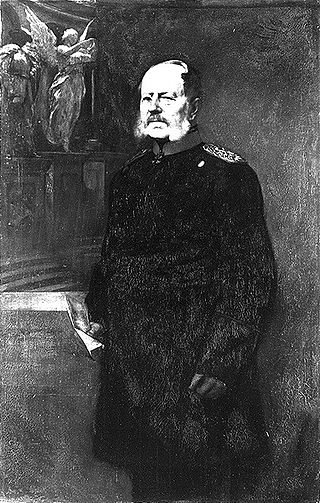
Karl Eberhard Herwarth von Bittenfeld was a Prussian Generalfeldmarschall. He served in many military conflicts throughout the 19th century and was given major commands throughout each conflict.
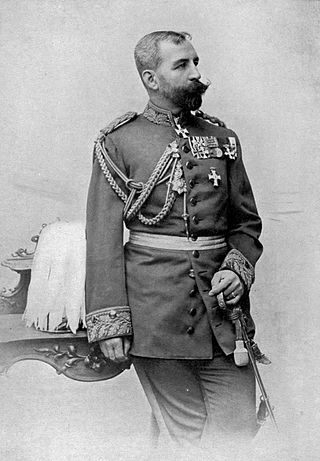
Friedrich Adam Julius von Bernhardi was a Prussian general and military historian. He was a best-selling author prior to World War I. A militarist, he is perhaps best known for his bellicose book Deutschland und der Nächste Krieg, printed in 1911. Describing war as a "divine business", he proposed that Germany should pursue an aggressive stance and ignore treaties.

Hermann Emil Gottfried von Eichhorn was a Prussian officer, later Generalfeldmarschall during World War I. He was a recipient of Pour le Mérite with Oak Leaves, one of the highest orders of merit in the Kingdom of Prussia and, subsequently, Imperial Germany. While serving as the military governor of Ukraine during the Russian Civil War, Eichhorn was assassinated by a Russian socialist.
Eduard Julius Ludwig von Lewinski was a Prussian general. His younger brother Alfred von Lewinski also became a Prussian general.
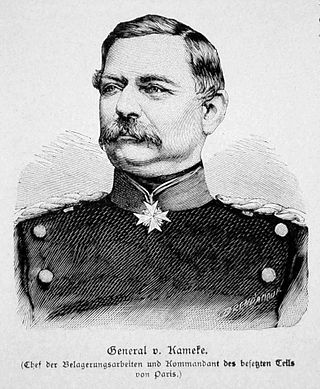
Arnold Karl Georg von Kameke was a Prussian General of the Infantry and Minister of War.

Eduard Friedrich Karl von Fransecky was a Prussian general who served in the Austro-Prussian War and the Franco-Prussian War.
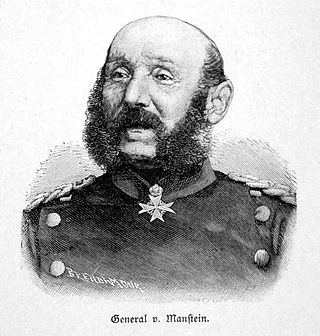
Albert Ehrenreich Gustav von Manstein was a Prussian general who served during the Austro-Prussian War and the Franco-Prussian War. He was the adoptive grandfather of Erich von Manstein.

Gustav Adolf von Wulffen was a German highly decorated officer in the Wehrmacht with the rank of Generalmajor and SS-Officer with the rank of SS-Brigadeführer. He was decorated with the highest prussian decoration for bravery, Pour le Mérite on April 21, 1918, as Battalion Commander.

Johann Karl Hermann Gronau, from 1913 von Gronau, commonly known as Hans von Gronau was a Prussian officer, and General during World War I.
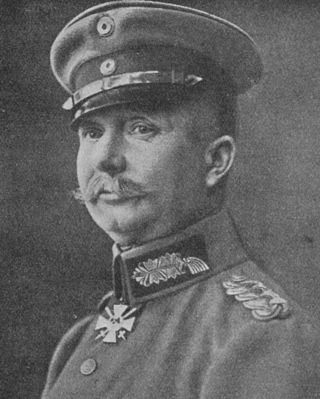
Eberhard Alfred Konrad Karl von Hofacker was a Württemberg army officer who was a Generalleutnant in the First World War and awarded the Pour le Mérite with oak leaves.

Rudolph Bodo Hans von Kirchbach was a Royal Saxon army officer who was a Generaloberst in the First World War and awarded the Pour le Mérite.

Karl Ludwig d'Elsa was a Royal Saxon army officer who was a Generaloberst in the First World War and awarded the Pour le Mérite.
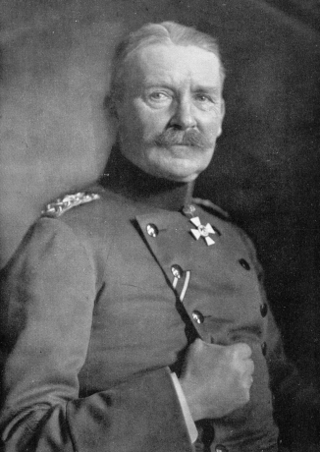
Alexander Ferdinand Ludolf von Quast was a Prussian military officer, participant in the Franco-Prussian War and a general in the First World War. He commanded the German 6th Army during the Battle of the Lys of the Spring Offensive in 1918.

Max Ferdinand Karl von Boehn was a Prussian and German officer who served in the Franco-Prussian War and World War I. He reached the rank of Generaloberst and held several high commands in World War I. He was decorated with the Pour le Mérite with Oakleaves, Prussia's highest award for military valor.

Heinrich Karl Ludwig Adolf von Glümer was a Prussian general who served in the Austro-Prussian and Franco-Prussian wars.

Hermann Friedrich Staabs, von Staabs was a German infantry general in World War I and commanding general of the XXXIX. Reserve Corps.

Johannes von Busse was a German lieutenant general who was most notable for his service in the Romanian Campaign of World War I.

Hans Adolf Julius von Bülow (1816-1897) was a General of the Artillery in the Imperial German Army. He was the Inspector-General of Artillery from 1879 to 1882. He retired when he had conflicts with Georg von Kameke, the Minister of War.



















